
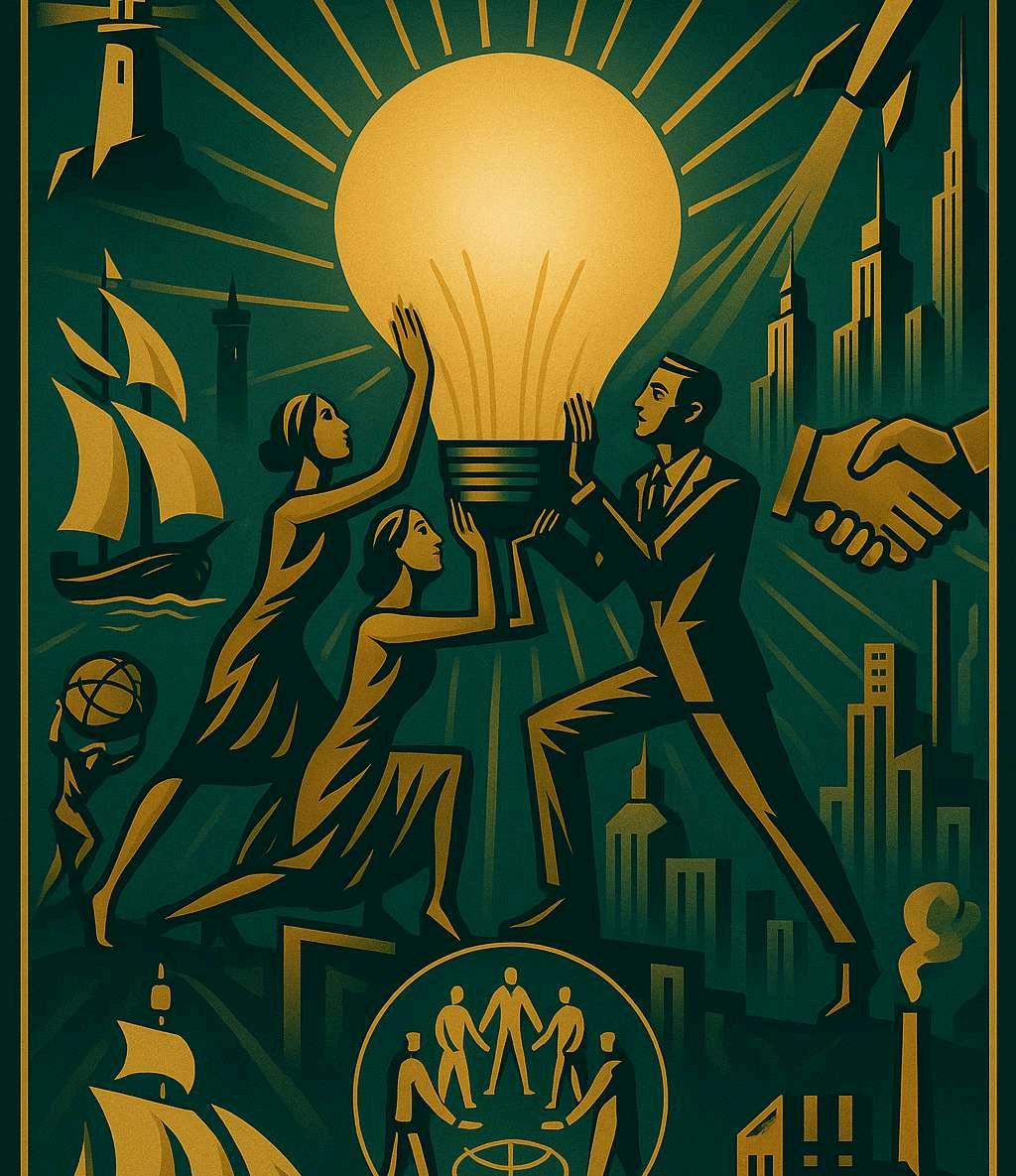
June 2025




June 2025


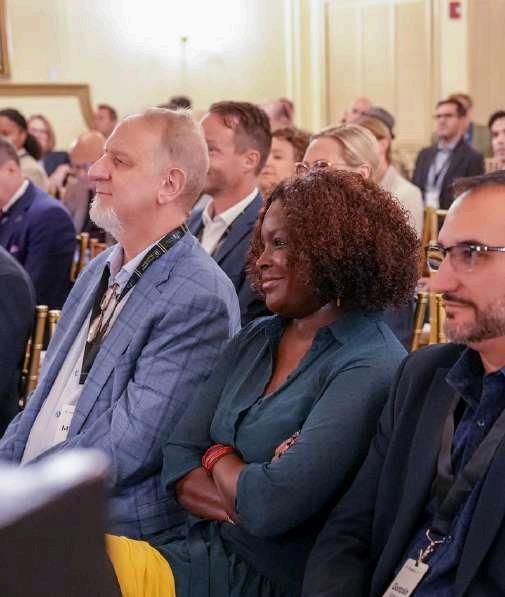






Welcome to the first issue of Capitalists for Capitalism - a magazine for builders, founders, investors, and leaders who believe that free enterprise is not just a mechanism for profit, but a moral force for good You’re holding (or scrolling through) a publication dedicated to championing the idea that business is not a necessary evil but a noble endeavor
This magazine is born out of a growing network of principled entrepreneurs and investors who are not content to watch capitalism be misunderstood, maligned, or misused Through Capitalists for Capitalism, we aim to tell the stories, share the strategies, and celebrate the values of those who are doing business the right way, that is with purpose, clarity, and with courage.
This is not a nostalgia project. We’re not here to pine for past prosperity or to defend the status quo We’re here to build and to rally those who want to build with us. If you’ve felt the cultural winds turn against the idea of wealth creation, if you’ve found yourself explaining why profits and people aren’t mutually exclusive, if you’ve had to justify that voluntary exchange is the most powerful form of cooperation humanity has invented - then you’re in the right place
Our inspiration comes from the Capitalists for Capitalism Manifesto, which you can read in full at libertyventures xyz/manifesto It’s worth your time At its core, the manifesto outlines the simple but powerful idea that capitalism, rooted in individual liberty and voluntary exchange, is the greatest force for human flourishing the world has ever known. But it only works when practiced by capitalists who are grounded in those core values.
Not central planning disguised as stakeholder management.
We mean capitalism in its purest and most principled form: earned success, open competition, creative innovation, and the dignity of productive work.
The magazine you’re reading is a platform for that vision. It will share:
Updates from the Network: Liberty Ventures is an ecosystem of 20,000+ leaders across the globe. We’ll report on events, investments, partnerships, and milestones achieved by our members.
Lessons from Leaders: In every issue, you’ll hear directly from some of the most accomplished, values-driven founders, executives, and investors we know They’ll share what they’ve learned, what they wish they knew, what’s working (and what’s not) in building principled and profitable ventures.
Opportunities to Engage: Whether it’s through events, new ventures, funding rounds, or mentorship circles, this magazine will point you to real-world ways to connect with likeminded capitalists.
This publication is also a declaration. A line in the sand We believe the best way to defend capitalism is to practice it better than ever before to prove through results, relationships, and reputation that principled business is not only possible but preferable We won’t beat the anticapitalists with tweets or white papers. We’ll beat them by building better companies, creating more value, and leading with integrity
That’s what this magazine is for: to spotlight the builders, to offer clarity where there is confusion, to give strength to the quiet majority of businesspeople who still believe in freedom, value creation, and personal responsibility

You won’t find empty virtue signaling here, nor blind cheerleading for big business This is a magazine for the earnest capitalists who understand that entrepreneurship isn’t just a way to make a living but also a way to live free.
To that end, we invite you to contribute: send us your stories, nominate leaders who exemplify principled capitalism and share your lessons. Challenge our thinking This is a movement and your voice matters.
Capitalism is not self-perpetuating. It must be understood, practiced, defended, and evolved That’s the mission of Capitalists for Capitalism. And we’re just getting started
Let’s build something better - together
For Liberty,

Founder&CEO


Book Review: The Happiness Experiment
written by Carl B Barney

Carl B Barney’s The Happiness Experiment: A Revolutionary Way to Increase Happiness is part memoir, part philosophical treatise, and part practical guide. What begins as a near-death experience aboard a failing aircraft evolves into an ambitious exploration of wealth, gratitude, and the pursuit of lasting happiness.
With candor and conviction, Barney invites readers on a journey that is as personal as it is universally relevant
The book is structured in three parts. The first, “Creating Pre-Quests,” introduces a central innovation: giving inheritances while still alive These “pre-quests” are not merely acts of generosity but tools to catalyze reflection, growth, and joy for both giver and recipient Barney recounts his own emotional process of recognizing the limitations of posthumous giving, emphasizing how powerful it is to witness the fruits of one’s generosity in real time
The second section, “Happiness Planning,” delves deeper into the framework Barney used to help friends and associates consciously shape more fulfilling lives
With the support of coaches and structured tools, recipients of Barney’s Happiness Grants don’t simply spend money but reflect, plan, and act with intention The result, Barney argues, is not indulgence but transformation.
In the third and final section, “The Happiness Experiment Results,” we see the lives of several recipients unfold, each navigating the psychological complexities and practical applications of this novel kind of support The message is clear: happiness does not result from wealth alone, but from meaningful engagement with one’s values, relationships, and aspirations

Barney’s writing is accessible and earnest, full of vivid storytelling, particularly in the early chapters. His recounting of the airplane explosion that catalyzed the project is gripping and reflective, capturing the paradoxical calm that sometimes accompanies neardeath clarity. It’s in these moments of existential reflection that the book achieves its most stirring depth
What sets The Happiness Experiment apart is its combination of philosophical principle and practical application. Grounded in a philosophy of rational selfinterest and personal responsibility, Barney’s experiment doesn’t chase the platitudes of generic self-help literature Rather, it challenges readers to think critically about their lives,a values, and legacies.
The book also raises important questions for wealth holders, estate planners, and philanthropists. Why wait until death to give? How might we transform generosity from a legal transaction into a living experience? What if money, thoughtfully applied, could be a catalyst for flourishing and not just security?
That said, the book is not without its risks Barney’s wealth and context may feel far removed from the average reader, and the scale of some gifts might seem extravagant; however, he wisely balances these examples with humble, human moments, like the story of the “Sixpence Lady” who, with one small gesture, inspired a lifetime of giving
Ultimately, The Happiness Experiment is a refreshing, provocative take on wealth, gratitude, and legacy It will resonate with entrepreneurs, philanthropists, and anyone interested in the deeper question of what it means to live (and to give) well.

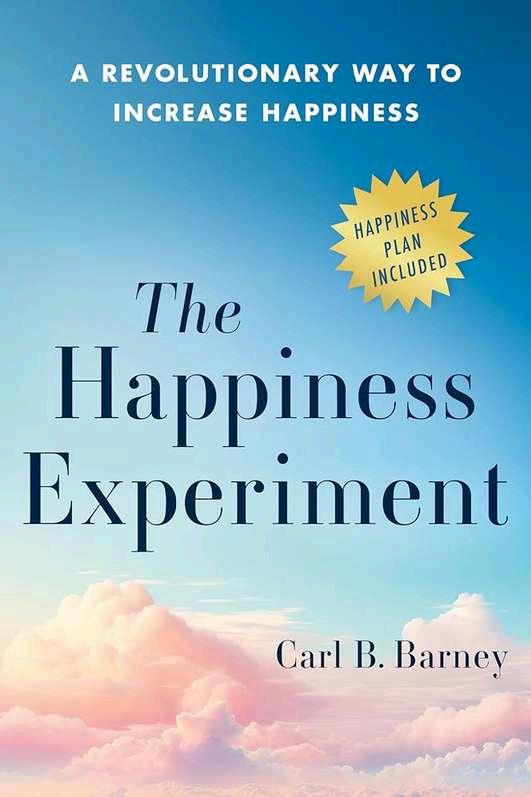



Each summer, thousands of entrepreneurs, investors, academics, artists, and liberty-lovers converge for one of the most dynamic and diverse conferences in the freedom movement: FreedomFest Behind it all is Valerie Durham, the event’s executive director, who not only runs the multi-day gathering but does so alongside her entire family in a mission-driven forprofit business that feels more like a calling
FreedomFest traces its roots back to 2002, when Valerie’s father, Austrian economist and financial author Mark Skousen, then president of the Foundation for Economic Education, saw a need to unify the liberty movement “At that time, everything was siloed,” Valerie explains, “He wanted to bring together think tanks, grassroots activists, and financial firms aligned with liberty ” What began as "FEE Fest" evolved into FreedomFest in 2007, and has only grown since, with now over 200 speakers, a sprawling exhibit hall, and thousands of attendees each year
The conference has become a platform for the full spectrum of freedom in what Valerie calls “a 360degree concept ” While political liberty remains central, FreedomFest also champions financial, health, intellectual, religious, and lifestyle freedoms. “We want people to live a lifestyle of liberty,” she says, “and that requires more than just one kind of freedom ”
That expansive vision explains why FreedomFest includes everything from high-level policy debates and financial strategy sessions, to film screenings, comedy shows, and even karaoke “Life is meant to be joyful We take on serious issues, but we also want to have fun”, adds Valerie.
Indeed, FreedomFest is as personal as it is professional. Some attendees have even found love at the event! Valerie notes several couples who met at FreedomFest, including two speakers this year who connected back in 2012. “You’re surrounded by likeminded, engaged people. It’s not surprising relationships- both romantic and professional- begin here,” as Valerie explains
That includes entrepreneurial success stories One standout example is Jeremy Cordon, who encountered a company called Valorum in the exhibit hall and went on to found Goldback, now a multimillion-dollar business creating transaction-ready gold currency used in several U S states As Valerie puts it, “FreedomFest is a trade show for liberty. These spontaneous collisions lead to revolutionary ideas ”
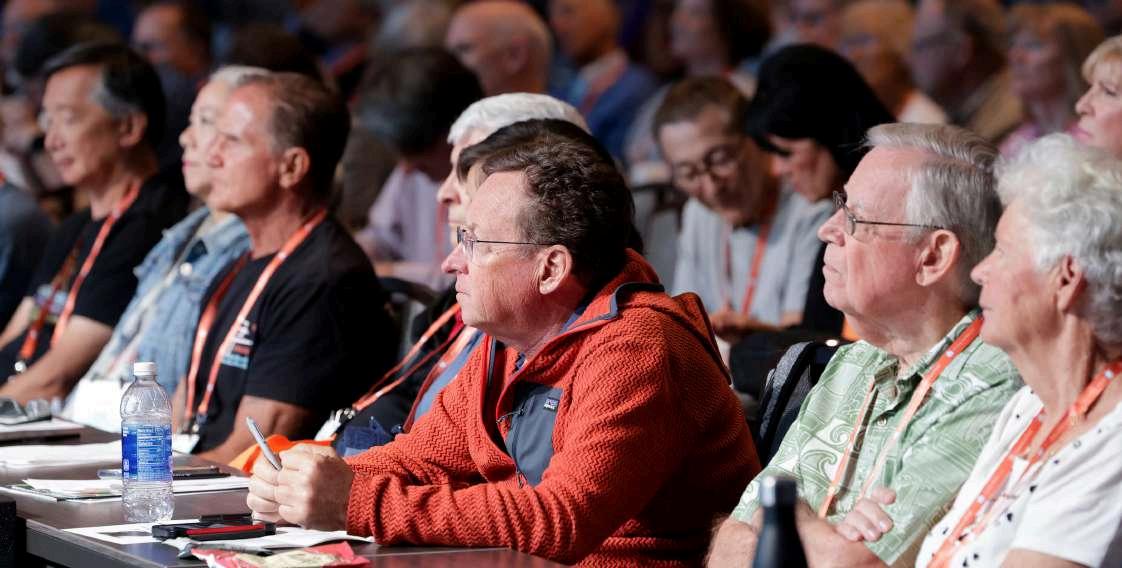


I can personally attest to that At one of my first FreedomFests, I met legendary investor Rick Rule, who became an early supporter of Students for Liberty and remains an engaged mentor and advocate That kind of serendipity is baked into the conference’s design
This year, FreedomFest is partnering with Principled Business to host a major pitch competition, drawing nearly 50 startup applicants Entrepreneurs will present their ideas before a panel of judges including Steve Forbes, Shawn Nelson, and Bert Ullman, with the final round taking place on the main stage “These aren’t just ideas. We might see the next Stripe launched here,” Valerie says
Complementing the competition are sessions focused on entrepreneurship, capital-raising, marketing, and scaling a business. “If you’re a small business owner or entrepreneur, FreedomFest is packed with practical value. And you’re not just hearing from speakersyou’re also having coffee with them,” Valerie explains
The lineup this year is remarkable: Ryan Holiday discussing philosophy with Prometheus Foundation, Adam Carolla on free speech, Kat Timpf returning to the stage post-cancer treatment, and a powerful conversation between Cornel West and Robert George on truth and civil discourse. There’s even Renato Moicano, a UFC fighter who quotes Hayek after matches, speaking on the importance of Austrian economics
For Valerie, the family dynamic behind FreedomFest only deepens its impact “We work hard, but we care deeply about each other and what we’re doing. And we’ve expanded that family We call it the ‘FreedomFest Fam’ Everyone who comes and contributes becomes a part of it,” Valerie tells us.
FreedomFest 2025 will take place June 11–14 in Palm Springs, California, under the theme Oasis of Liberty
As Valerie says, “We’re taking over the town, and helping people find the oasis of liberty in their own lives ”
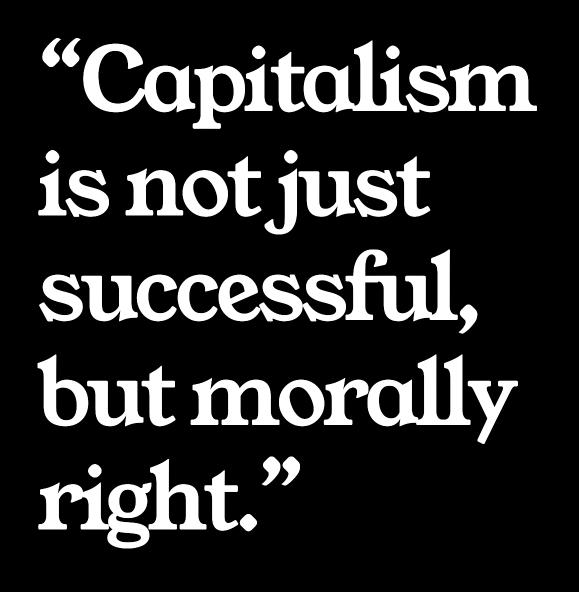

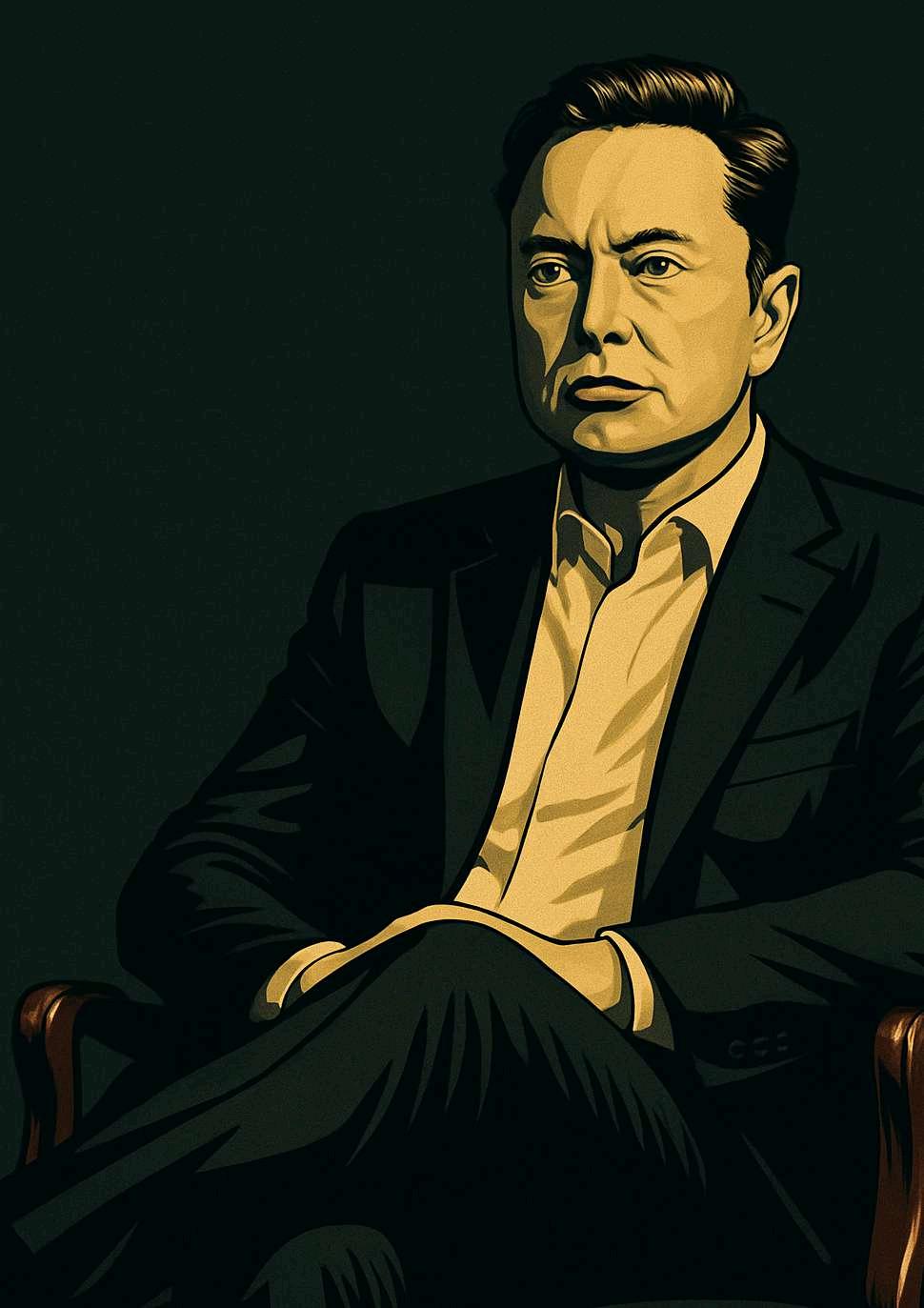

In a world where many capitalists remain silent about the system that enabled their success, venture capitalist Tim Draper is refreshingly vocal A tireless champion of innovation, entrepreneurship, and economic freedom, Draper’s unapologetic defense of capitalism is lived, invested, and institutionalized in everything he touches, from early Bitcoin bets to Draper University
We spoke with Draper in early 2025 and his energy was unmistakable The timing was crucial After years of regulatory headwinds, Draper sees a turning point in U.S. policy, particularly toward crypto and innovation
“THIS IS THE FIRST ADMINISTRATION IN AMERICA TO RECOGNIZE THE IMPORTANCE OF BITCOIN, BLOCKCHAIN, SMART CONTRACTS, AIRDROPS - ALL THE TECHNOLOGIES THAT ARE GOING TO RESHAPE FINANCE,” DRAPER SAYS. “THEY'RE FINALLY ENCOURAGING ENTREPRENEURS AGAIN.”

For Draper, crypto is a global equalizer It brings financial inclusion to the unbanked and expands the economic pie for all He cited examples from around the world: Bitcoin in everyday commerce in El Salvador, blockchain-based identity systems, and a swelling tide of decentralized finance that empowers billions.
He’s thrilled that, for the first time, America may not be left behind “Entrepreneurs used to tell me they had to build in Singapore, geo-fence the U S , or exclude American users entirely,” he says “That’s not innovation-friendly But now I think I can stay in America, and innovation will thrive again.”



Draper’s confidence isn’t just ideological it’s predictive. He famously forecast Bitcoin would hit $10,000 back when it was $180 That prediction came true in 2017, almost to the day His next big call: Bitcoin at $250,000 “We may blow past that this year,” he says, “and that might even be conservative.”
But Draper’s passion for Bitcoin is part of a broader thesis that freedom and trust are the magic behind American innovation “Silicon Valley worked because of those two things: freedom to experiment and trust in entrepreneurs. When regulation gets heavy and trust erodes, people stop creating here.”
He points to the Draper Innovation Index, which ranks countries by how friendly they are to entrepreneurs. While the U S remains on top, he warns that others like Singapore, Switzerland, and the UK are closing in fast “If we don’t fix our regulatory state, we’ll lose the edge.”
So what does he think should be done?
“Deregulate. Shrink bureaucracy. Not necessarily government, but the bureaucracy It’s just people creating rules that strangle business I don’t want to think about the SEC or FDA the moment I come up with an idea,” he tells us
He proposes simplifying taxes too. “We don’t need volumes of toxic tax code. Make it 10% on your first million, 20% on the next ten million, 30% after that Flat, simple, no loopholes ”
He believes common-sense reforms like that could unite the country “Democrats and Republicans both like it. It treats everyone equally.”
For Draper, these are not abstract policy debates They’re deeply tied to human flourishing He draws sharp lines between capitalist and socialist systems and uses data to drive the point home
“People say socialism worked in Sweden, but look at the numbers: Sweden’s growth came after they added more capitalism, not more socialism ” He contrasts Cuba and North Korea where socialism dominates, with South Korea’s vibrant, free-market success. “South Koreans earn 460 times more than North Koreans and are four inches taller on average That’s capitalism at work.”
Yet in the U S , too many capitalists are hesitant to speak up “When a country gets wealthy, it breeds a culture of envy,” Draper warns. “People want to tear down Elon Musk or Jeff Bezos, but they should be celebrated Elon is saving the planet or getting us off of it. Bezos gets me a toothbrush in four hours. These people are heroes.”
He’s not afraid to call out the corrosive effects of envy-driven politics. “It creates a culture of need rather than opportunity People start thinking, ‘If I need more, I’ll get more ’ That erodes self-reliance,” he explains.
His prescription is clear: simple rules, universal enforcement, and a renewed emphasis on entrepreneurship. That’s part of why he founded Draper University of Heroes, a school designed to train the next generation of innovators
“When people said entrepreneurship can’t be taught, I asked, ‘How would I teach it?’,” Draper recalls The answer? Experiential learning, real-world challenges, discomfort, and resilience. “It’s not lectures. It’s survival training for entrepreneurs physical, emotional, intellectual We train people to lead ”
The university eschews accreditation and nonprofit status intentionally “We’re not here to check bureaucratic boxes We’re here to promote freedom and trust.”

And it’s working Students heard about Bitcoin five years before it hit mainstream universities One used his Bar Mitzvah money to buy crypto that he later used to fund his startup with. Alumni have launched major blockchain ventures like Tron and Quantum
Draper believes a free market in education is just as essential as in business “Public education used to be number one in California Now it’s near the bottom,” he says. “We need money to follow the student. Let parents choose. Let principals hire and fire ”
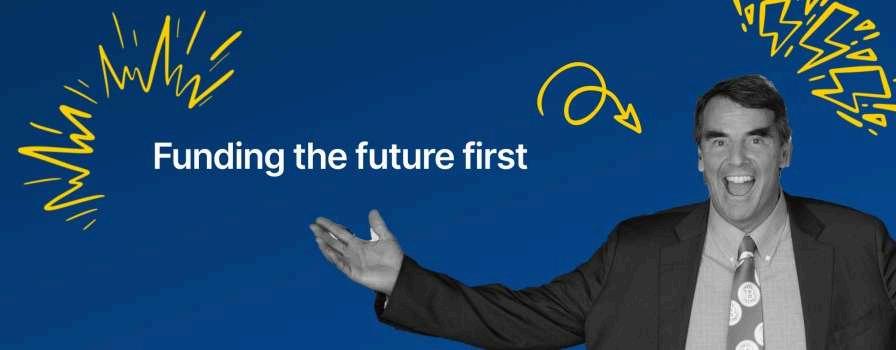
As the conversation closes, Draper returns to first principles: work, dignity, and service
“Everyone I know who works is happy. Doesn’t matter if it’s flipping burgers or founding a company: they have pride The ones who stopped working? They’re miserable. Addicted. Lost. Work gives us purpose.”
And for Draper, that’s the heart of capitalism, not just wealth, but meaning.

“Capitalism isn’t perfect, but it works. And every attempt to replace it has failed. So if you want more freedom, more dignity, more opportunity: stand up for capitalism.” - Tim Draper
In an era of economic doubt and regulatory uncertainty, Draper offers a powerful reminder: the path to a more prosperous, purposeful society isn’t through control but through freedom. The kind of freedom that lets entrepreneurs try, fail, try again, and change the world in the process



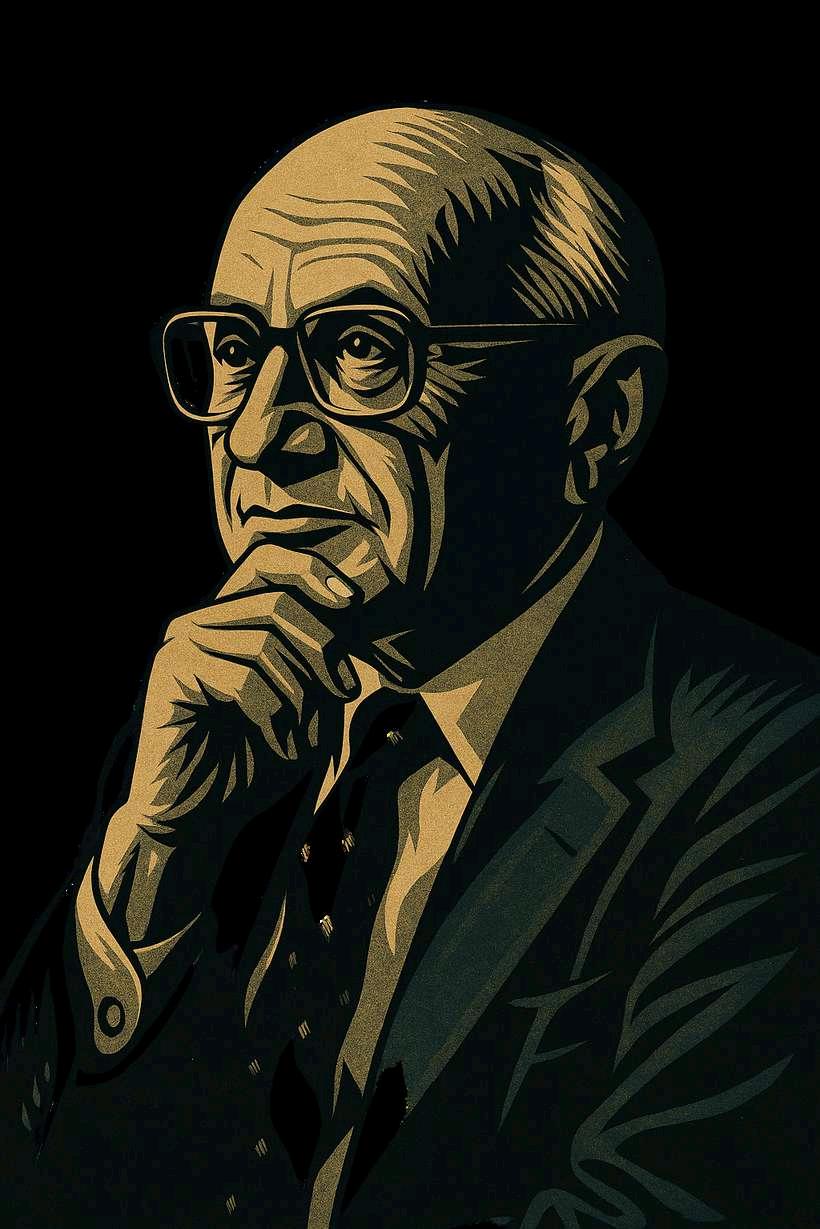



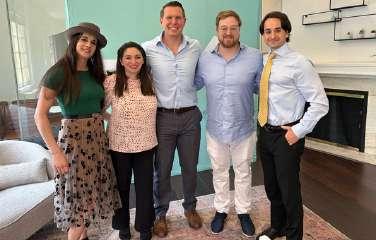
















Critics of capitalism often level a moral charge: “Capitalism is immoral.” They say it prioritizes profit over people, enables exploitation, and concentrates power in the hands of the wealthy These concerns deserve thoughtful engagement, but they rest on flawed assumptions. Here are several ways to respond:

At its core, capitalism is a system of consensual trade. No one is forced to buy, sell, or hire under free-market capitalism. Unlike coercive systemswhether feudalism, socialism, or crony statismcapitalism requires mutual agreement When two people voluntarily exchange goods or services, both believe they are better off That mutual benefit makes capitalism not just moral, but uniquely respectful of individual dignity. When functioning properly and without government favoritism or bailouts, capitalism rewards people who create solutions. Anyone, regardless of background, can succeed if they meet the needs of others From immigrant entrepreneurs to garage inventors, capitalism has lifted millions out of poverty by aligning success with service That’s a far cry from immorality and in fact, it’s one of the fairest systems ever devised.
A common myth is that profits are extracted from workers or customers, but in reality, profit is a signal that a business has created value, solved a problem, served a need, or used resources efficiently In a competitive market, profits are earned by delivering something people choose to pay for. This isn’t exploitation - it’s innovation and service The smartphone in your pocket, the food on your table, or the medicine that saves lives: these all exist thanks to profit-seeking under capitalism.
Every economic system must answer one question: How are resources allocated? Under socialism or authoritarianism, the answer is by force, either by government mandate or political favoritism Under capitalism, the answer is choice You can work where you want, buy what you want, and support the causes you value That freedom is ethical


Since the rise of global capitalism, extreme poverty has plummeted. In 1820, over 90% of people lived in extreme poverty Today, it’s less than 10% Life expectancy, literacy, and living standards have skyrocketed, all thanks to free enterprise. No other system has done more to materially improve human life If morality is measured by human flourishing, capitalism wins hands down.
It’s true: capitalism can be twisted by greed, dishonesty, or corruption, but that’s not a flaw unique to markets. It’s a flaw of human character The solution isn’t to abandon capitalism, but to practice it better Ethical business, principled entrepreneurship, and voluntary philanthropy are all alive and well within capitalism The system doesn’t eliminate vice, but gives room for virtue to thrive

Capitalism isn’t immoral It’s the most moral economic system we’ve discovered It respects individual agency, rewards service, promotes peace, and drives progress The challenge isn’t to replace capitalism, but to live up to its highest ideals.


At the heart of capitalism lies a deceptively simple idea: individuals have the right to make choices for themselves The concept of respect for individual agency is not just a moral foundation of capitalism but a key reason why it works so well in practice. It affirms that each person is the best judge of their own values, needs, and aspirations, and it entrusts them with the freedom to act accordingly.
In contrast to top-down systems where bureaucrats, central planners, or special interests dictate outcomes, capitalism is a bottom-up system powered by individual decision-making. Workers choose where to apply their labor Consumers decide which products to buy Entrepreneurs take risks to pursue their visions Investors allocate capital based on their judgments of value and return At every level, agency drives the economy forward

Respecting individual agency is good ethics and effective economics When people are free to choose, markets become dynamic, creative, and responsive No central planner could have invented the smartphone or the gig economy These innovations emerged from countless individuals experimenting, adapting, and responding to realworld needs.
Moreover, capitalism's respect for agency fosters accountability. In a truly free market, businesses must earn loyalty, trust, and revenue through performance and not coercion Consumers can walk away. Employees can leave Investors can divest This voluntary nature creates constant feedback and incentives to serve others well




So how can companies actively respect individual agency in their day-to-day operations? Here are several practical strategies:
reat your team as responsible adults, not cogs in a machine. Give them autonomy to make decisions, solve problems, and own their outcomes Micromanagement kills motivation Agency builds trust and drives innovation.

Businesses shouldn’t push customers into options they don’t want Transparency, honest marketing, and flexibility in service all reinforce agency. The more a customer feels in control, the more likely they are to return.

Profit-sharing, stock options, and employee equity give workers a real stake in outcomes. When people are owners and not just renters of their labor, they act with greater initiative and care.

Products and services should enhance users’ ability to shape their own lives, not manipulate behavior. Think of how some platforms nudge or trap users Now think of how others empower them with tools, education, and choice Which do you want to build?

Businesses that thrive in capitalism respect the right of others to say “no.” Ethical negotiation, fair pricing, and mutual consent are all expressions of agency.

In an age when institutions (corporate and governmental alike) often veer toward paternalism or control, businesses grounded in the principle of individual agency stand out They don’t treat people as problems to be managed but as partners to be respected.
Capitalism is not a system of chaos but one of freedom under responsibility. That starts with honoring each individual’s ability to think, choose, and act. Respect that, and you unleash the full moral and productive power of the market











By Capitalists for Capitalism Magazine Staff

Amit Singh, CEO of NearStar Fusion, is no stranger to global conflict After a 25-year career in the U S Intelligence Community, he developed a clear thesis: many of the world’s wars and crises, cloaked in ideology, are in fact rooted in energy scarcity. With this insight, Singh turned his attention to solving one of humanity’s most foundational problems: clean, abundant energy And for him, the answer lies in fusion “Fusion energy is the final energy source humans will ever need,” Singh explains, “It’s the most energy-dense form in the universe: four times more than uranium, and the Earth has a virtually unlimited supply of fuel for it, extracted easily from our oceans ”
The power source that drives the sun could also power our planet safely and sustainably. Fusion emits no carbon, doesn’t rely on chain reactions like fission, and isn’t limited by geography, weather, or even Earth’s surface. “It works in outer space,” Singh adds with conviction Perhaps most importantly, it offers energy without the political strings and instability of oil and gas markets.
Singh’s entry into NearStar Fusion wasn’t through an executive search firm or a think tank but by neighborly luck “My neighbor was close friends with one of the co-founders and made the introduction We hit it off immediately NearStar offered the perfect intersection of my experience and my desire to learn and build something transformative.”
At the core of NearStar’s mission is a distinctive approach to fusion. While most of the industry is divided between magnetic confinement (like tokamaks) and inertial confinement (like laser-based systems), NearStar employs a hybrid model with a scalable and modular design aimed at producing 50-megawatt fusion power plants

“Our innovation lies in using a hypervelocity railgun,” Singh says, “It launches projectiles at 10 km per second, enabling us to magnetize the fusion fuel upon impact This allows us to avoid rare, costly components like hightemperature superconductors and tritium.”
Instead of building billion-dollar facilities around rare isotopes and exotic equipment, NearStar’s method utilizes existing supply chains and materials like molten lead or salt to absorb heat and neutrons The scientifically elegant result is an approach that is commercially viable.


“Every simplification compounds,” Singh explains, “We don’t need to breed tritium. We don’t rely on lasers or superconductors This makes our timeline shorter and our operations more profitable.”
That timeline is ambitious: Singh projects NearStar Fusion will reach commercialization in under a decade, faster than it typically takes to permit and build a traditional nuclear plant in the U.S. The regulatory tailwinds are favorable too Since 2024, fusion in the United States has been regulated under 10 CFR Part 30, the same framework used for nuclear medicine, thus massively reducing the red tape involved
This rapid path to deployment is critical, Singh argues, not just for NearStar’s growth but for meeting the exploding global demand for energy. “AI data centers, crypto mining, electric vehicles, and industrial electrification are all straining the grid. People need energy that is clean, affordable, and resilient.”
While public investment in fusion science laid important groundwork, Singh emphasizes that the future of fusion now depends on capitalism. “Without private investors motivated by profit, fusion would remain in the lab. The federal government can fund science, but it’s the capitalists - people like Sam Altman, Bill Gates, Jeff Bezos, and Vinod Khosla - who are driving the race to commercialization ”
And NearStar Fusion is ready to compete. Their model is designed for serialized manufacturing and global scalability “We’re not building one plant We’re building the playbook for thousands,” Singh says, “Near-term investment, facility expansion, and top talent can shorten our timeline and get us to commercialization faster ”
For Singh, the mission is about more than technology or even energy: it’s about aligning profit and principle and solving one of the greatest challenges of our time through innovation, entrepreneurship, and belief in a freer, more abundant future.
“In many ways, fusion is the ultimate capitalist technology,” he concludes, “as it meets global demand with abundance, drives down costs through scale, and rewards those who solve hard problems. It’s the clean energy future we were promised, and we’re building it now.”
Curated list of mission-aligned companies Company pitches, Q&A, and advice on job hunting from recruiters
Over 100 skilled candidates


Held during the week of the Milton Friedman Prize Dinner and the 33rd Benefactor Summit, the DC Lunch Roundtable was a high-trust gathering of liberty-minded entrepreneurs and investors who share a commitment to freedom, human flourishing, and principled business.
Co-hosted with the Archbridge Institute, the event created space for deep conversations on how founders and funders can work together to build ventures that not only succeed financially but also advance upward mobility and cultural renewal Rather than networking for its own sake, the lunch emphasized clarity of purpose, long-term alignment, and the kind of entrepreneurial courage required to build in today’s environment
Business can be a powerful vehicle for human flourishing, when rooted in both incentives and values
Cultural change requires long-term commitment and alignment between investors and builders
High-trust relationships open the door to authentic collaboration and principled risk-taking.
Founders are looking not only for capital, but also for conviction in the form of partners who share their deeper mission.
Creating small, intentional spaces for dialogue leads to outsized impact over time
This event reinforced what many already know intuitively: that liberty-minded entrepreneurs thrive when they are seen, supported, and surrounded by others who believe that freedom and responsibility go hand in hand.
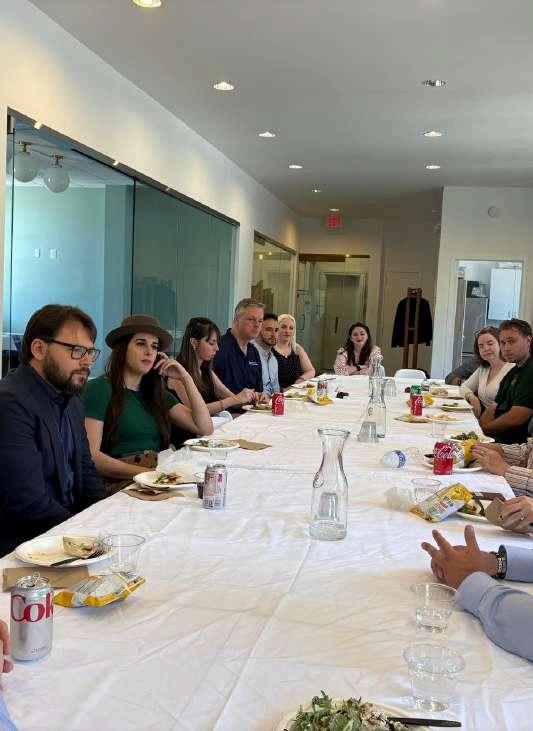

At our first Liberty Ventures Job Fair, we brought together 13 principled companies and 103 rising professionals for more than just interviews This event was about finding alignment between values, vision, and vocation From early-stage startups to established mission-driven organizations, every employer showed up to recruit and also to share what they’re really looking for in candidates The event pulsed with possibility, and the advice shared will stay with attendees long after the booths were packed up
Show your skills, don’t just list them. Demonstrate what you’ve built, how you think, and how you work
Be genuinely invested.
Hiring managers notice when you ' ve taken the time to learn their mission and see yourself as part of it
Leverage your network Community matters Referrals, mentors, and platforms like Liberty Ventures open doors no résumé can
From AI to fintech, public policy to remote staffing, these companies are proving that capitalism with character is possible:





Our Job Fair was about opening futures and was proof that you can pursue professional growth without leaving your principles behind. It also demonstrated that the market for freedom-minded talent is alive and very much thriving.
What’s Next? This was just the beginning.
The next Liberty Ventures Job Fair is on July 15th and we are planning on more ways for principled companies and emerging talent to meet.
5-min pitch
filtered candidates
employer branding
Date Jul,152025

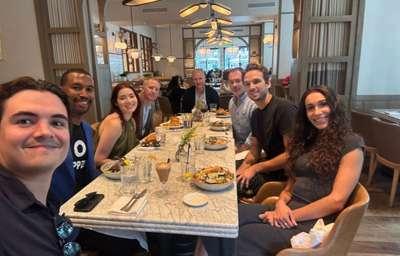
What unfolded was not a how-to session, but a reframing of what it means to build something that matters. Francisco spoke openly about the moments of doubt that define the entrepreneurial journey and the courage it takes to move through them. He challenged the room to reject conventional paths in favor of continuous, self-directed learning And he made a compelling case for leading with love not as sentimentality, but as strength.
The founders in the room didn’t walk away with just “tips” but with also a renewed sense of purpose and a reminder that building with integrity demands both grit and grace
Some events resonate long after they’re over and our Liberty Ventures Lunch in Miami was one of these It was a shared moment of clarity and commitment among builders who are scaling companies and also stewarding ideas that matter
Hosted in an intimate setting, the conversation featured Francisco Gonzalez, entrepreneur, podcast host, and author of The American Dream is a Terrible Thing to Waste. Francisco offered a candid look at what it really takes to build something meaningful. His stories were lived experience, which is precisely what made the conversation all the more powerful
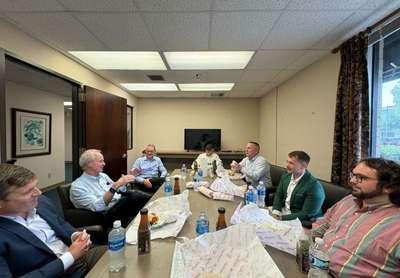
Our first Liberty Ventures gathering in New Orleans marked a new pin on the map. It also opened a crucial conversation about the role of capitalism in rebuilding trust, prosperity, and innovation in Louisiana
This lunch brought together builders, thinkers, and advocates committed to that mission and opened the door for deeper collaboration in the region
We were honored to have Jay Lapeyre, business leader, investor, and longtime advocate for liberty, join the discussion His perspective reinforced the idea that principled leadership and free enterprise are essential to unlocking Louisiana’s full potential
One key insight that emerged was that many people in Louisiana still see entrepreneurship and capitalism through a distorted lens. So the challenge isn’t just building principled businesses but also reshaping the narrative
That’s where Liberty Ventures and Principled Business step in as we are here to do both: support founders on the ground and help articulate a compelling case for capitalism as a force for human flourishing.
Fear often sneaks into our decisions, slowing down progress and clouding vision, especially for leaders building businesses with purpose John Hagel’s recent webinar, inspired by his book Journey Beyond Fear, challenged this paralysis by offering a fresh perspective on how to move beyond fear and reclaim agency in uncertain times
At the core of his message were 2 transformative ideas: narratives and passion Unlike stories, which are fixed accounts about others, narratives are dynamic and open-ended. They position you as the protagonist shaping the future, inviting active participation instead of passive acceptance
Equally vital is the passion of the explorer with a restless curiosity and courage to embrace growth, confront unexpected challenges, and collaborate deeply with others. This passion is not something distant or rare and is already within each of us, waiting to be awakened
If you’re ready to start your own ‘Journey Beyond Fear’ , John’s book is a must-read Grab your copy here and discover how to unlock your full potential as a fearless leader.

At the Liberty Ventures gathering during the Milken Institute Global Conference, Khaliya captivated the room with a powerful reminder that impact doesn’t belong to just one path It belongs to those bold enough to create change, wherever they stand.
From serving in the Peace Corps to tackling infectious diseases at the Council on Foreign Relations, from working in national security to backing nonprofits and now building a venture to support women’s mental well-being, Khaliya’s journey is anything but conventional. And that’s exactly the point she makes.
In a conversation that flowed with insight and purpose, she shared why mental health is both a personal issue and a systems issue. Her new for-profit venture aims to give women the tools and networks they need to thrive with independence and dignity.
The event, hosted at Love Life and in partnership with Abraham House, was a call to rethink how we build support, how we scale compassion, and how business can serve healing
For those building purpose-driven futures, Khaliya’s story is fuel.

At the Liberty Ventures / Principled Business Reception in Dallas, Sunny Vanderbeck, co-founder and CEO of Satori Capital, brought the room to life with a story that was extraordinary From building his company, selling it, buying it back, and selling it again, Sunny’s journey challenges the usual narratives about entrepreneurship and exits His message? How you sell your business matters just as much as how you build it.
Yet, what truly set his talk apart was his unshakeable commitment to conscious capitalism. Even when the pressure was on to abandon those ideals, Sunny stayed the course, and it’s clear that sticking to principled values is not only the right thing to do but also gives you a powerful edge in today’s market.
Here’s what resonated most with the audience:
Thinking beyond profits: Crafting intentional exit strategies that protect your legacy
Leading with conviction: Why staying true to your principles drives sustainable success.
Investing with purpose: How conscious capitalism shapes smarter, more impactful decisions
Sunny’s insights remind us that principled leadership is a game changing philosophy
What if the path to a healthier planet doesn’t lie in restriction, but in creation?
At our Liberty Ventures Webinar, Isaiah Menning of the American Conservation Coalition (ACC) challenged long-standing environmental orthodoxies For decades, the dominant message has been to limit, regulate, and slow down; however, Isaiah offered a compelling counterpoint that free markets, economic growth, and human ingenuity are not enemies of nature but are in fact the most powerful tools we have to protect it.
He walked us through ACC’s approach to environmentalism, one that embraces innovation, entrepreneurship, and abundance. From reforming energy permitting to rethinking species protection, the conversation spotlighted how policy rooted in freedom and forward motion can yield real, lasting environmental outcomes
Isaiah’s message was clear: it’s time to stop framing growth and conservation as trade-offs We don’t need to choose between prosperity and sustainability We need to build both.

Against the backdrop of Bryce Canyon, Liberty Ventures hosted its first-ever Utah gathering at Jets & Capital, an event where capital, character, and longterm vision took center stage
With Jordan Hutchinson leading the conversation, attendees explored more than just alternative investments, and unpacked what it means to build generational success with purpose. From capital raising strategies to impact-driven philanthropy, every discussion pointed to a future where wealth and wisdom go hand in hand.




The event also included access to the 7th Annual Bryce Canyon Deming Forum, hosted by The W. Edwards Deming Institute, offering an in-depth look at how systems thinking can transform organizations and unlock collaborative potential.
The tone? Warm, engaged, and driven A perfect reflection of what Liberty Ventures does best: bringing principled capitalists together to shape a freer, more prosperous tomorrow.













Limited to 40 Participants only.












Limited to 40 Participants only.










In March 2025, Principled Business convened 40 of the most purpose-driven founders, CEOs, investors, and innovators on Necker Island for an unprecedented gathering with Sir Richard Branson. The goal for this summit was inspiration, co-creation, strategy, and action.
Unlike traditional summits where a few speak and many listen, Necker Summit flips this model: every attendee is a speaker Each leader took the stage to share their mission, challenges, or venture, inviting insight, connection, and partnership These talks were real, unfiltered, and full of courage
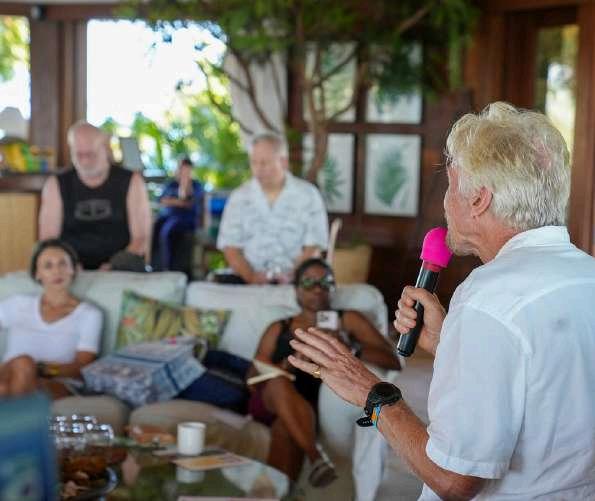

Sir Richard Branson, hosting us at his home and encouraging founders to challenge convention.
John Mackey, Co-Founder of Whole Foods, on conscious capitalism in action.
Brock Pierce, Chairman of the Bitcoin Foundation, on freedom, digital transformation, and decentralization.
Each session sparked action Business models were challenged, ventures were reshaped, and partnerships emerged All of these were grounded in a shared belief that capitalism, rightly practiced, is the most powerful force for good the world has ever known
Attendees left inspired, and supported Every Necker participant was inducted into the Liberty Ventures Leadership Circle, gaining a full year of exclusive events, curated 1:1 connections, and access to a network of 15,000+ principled leaders across the globe
What’s next? We return to Necker Island on May 16–20, 2026 Will your voice be on the island? Applications are now open

JeVon McCormick’s journey is a powerful testament to the transformative power of resilience and mentorship. Growing up in the face of horrific abuse, racism, and poverty, JeVon once found himself homeless as a student, circumstances that could have defined his future. Instead, they fueled a mission that now shapes every aspect of his work as CEO of Scribe Media, a company dedicated to helping individuals share their stories by writing, publishing, and marketing their books
JeVon’s story goes beyond business success. It’s one that shows how the right support and opportunities can change a life. One of the most touching moments in his career came during a keynote speech in his hometown, when he unexpectedly reunited with his high school teacher, Mrs. Porter. Their emotional exchange highlighted the deep impact mentorship can have, a theme that runs through JeVon’s life and work.
Today, JeVon uses his platform not only to build a thriving company but also to uplift at-risk youth, mentoring young people in the juvenile justice system and underserved communities
He reminds business leaders that true entrepreneurship is about creating opportunities for others, leading with empathy, and embracing the power of personal stories.
Recognized as Best CEO in Austin and featured in CNBC, Forbes, Entrepreneur, and Inc., JeVon embodies the spirit of conscious capitalism. His message is clear: everyone has a story worth telling, and those stories can change the world.
This magazine, and more importantly, all of the work that is described in these pages, is thanks to the hard work of a large group of leaders in both Liberty Ventures and Principled Business, working day in and day out to build the movement of capitalists for capitalism.
Liberty Ventures Team
Michelle Bernier
Isabella Castillo
Camilla Chellapermal
Graziano Creperio
Melissa Doolin-Koehne
Diego Laurentin
Alexka Medina
Alexander McCobin
Zussel Ramos
Kenli Schoolland
Principled Business Ambassadors
Luis Silva-Ball
Magnús Örn
Steve Thomas
Adam Karl
Anar Alizamanli
Dan Garretson
Dustin Palmer
Patrick McLaughlin
Fabricio Antezana
Gabriel Grilli
Igor Zillner
Jason Syversen
Johnathan Bush
Julio Clavijo
João Ferreira
Mischa Kowall
Nolan Lwin
Rajat Vishwakarma
Rodrigo Nuila
Scott Alford
Valera Vasquez
Yoseob Lim
Ali Khan
Brian Bourgerie
Akin Oladosu
Håkon Broder Lund
Eden Eyjólfsdóttir
Pavel Koktyshev
Gustavo Toxzui Xopa
Danny Chen
Prosperine Hollande Nduwayo
Cynthia Reyes
Adolfo Urquizo
Ishmael Amini
Niko Klein
Haukur Ingi Sigrúnar
Jónsson
Jóhann Portal
Clement Ngu
Zachary Silva
At Principled Business, we champion a vision of free enterprise rooted in human dignity, long-term value, and ethical leadership.
Your contrib

Leadership forums that elevate value-aligned entrepreneurship
Mentorship and capital for rising founders
Advocacy for liberty-based, principled business practices
A global network of changemakers driving impact with purpose